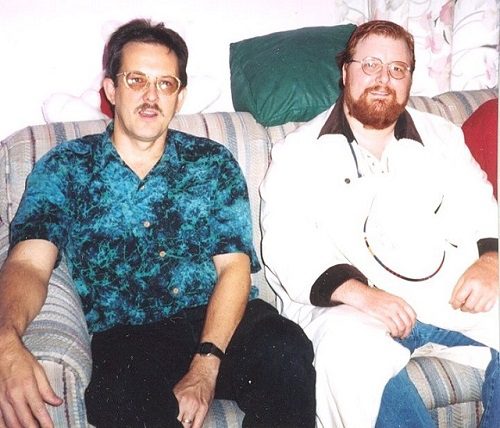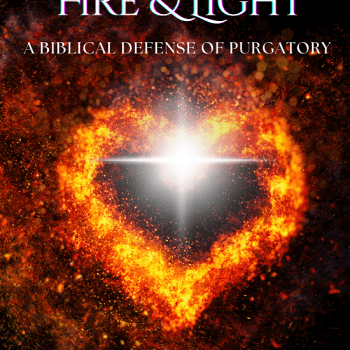
With fellow apologist Jimmy Akin at my house in 2004. We met again at the Catholic Answers offices in May 2011.
*****
Obviously, with each new wave of apologetics and outreach efforts there will be innovations and fresh approaches. I want to see “new guys” who are doing a good job, get more exposure and recognition. More power to all of ‘em. I commend any such efforts and rejoice to see them. But I don’t think there is any essential (or even very great) difference here.
We’re all in this together and can all learn from each other. If someone learns something from me I am flattered and give the glory to God; but I hope to always be open to learning from others, too, including the so-called “young guns.” I don’t want to ever become the “old dog” (at the ripe old age of 53) that can never learn “new tricks.”
As an example of some of what I was contending above, see the feature article on the anti-Catholic Beggars All site, by John Bugay, entitled, “The Bryan Cross Method Alert” (5-10-10). After all kinds of swipes taken, Bugay concludes at length that Cross’s “method of argumentation is inherently dishonest.”
Nothing new under the sun. If Cross is using some kind of “new” method that is distinguishable in any significant way from older ones, the net result in the anti-Catholic’s eyes is exactly the same. It’s not a whit more effective in convincing people who are fundamentally hostile, than anything that has been done in the last 20 years online. Bugay attacks Cross again in an article dated 3-25-11, saying,
Bryan is one of those individuals in search of “the correctly marketable term,” a new phrase he can coin and throw out there to “the academy,” which will have his name attached to it, and for which people will fawn over him. . . . Maybe, someday, Bryan can be known, like Bultmann, for having discerned “the separation of the Jesus of history from the Christ of faith.”
These dynamics are inevitable. Called to Communion and Bryan Cross are relatively well-known, among the “young guns.” Therefore, they are being increasingly attacked and savaged. The same thing will happen to anyone else who crosses paths with the leading anti-Catholics. The closer you get to the “front lines” and the longer you stay there, the more attacks will come (and with them the altogether human temptation to respond in kind, or to act in ways quite differently from a sweet, saintly demeanor). It’s the nature of spiritual as well as military warfare.
Once a few points are scored in debate, then the anti-Catholic fangs come out and it is never the same again. I guarantee that the young guns will not fare any differently, the more they engage these folks. And there is a time for a rebuke and strong language, too, if it is warranted.
Any apologist who thinks that his work can and will always be “nicey-nicey” and “smiley” and all wrapped up in a pretty bow will have to learn the hard way, and may be in for some major disenchantment or disillusionment (I’ve seen many people “burn out”). If difficult scenarios and strong (personal) opposition aren’t encountered, then (sorry), I don’t think an apologist is fully doing his job. Opposition (and hence unpopularity) is inevitable.
With Protestants who are ecumenical, though, there is no problem achieving amiable, cordial, constructive debate. It’s like night and day. Therefore, I contend that the essential difference is not some supposedly significantly “new” apologetic method vs. older ones, but rather, the difference in how an anti-Catholic Protestant responds, vs. how a Protestant who considers Catholics brothers in Christ will respond, and how the former responds, in direct proportion to how familiar he is with a Catholic opponent, and how many times he has been bested in argument by same.
Precisely the same dynamic also applies to apologetics in exchanges with atheists. There are the angry, irrational, “anti-Christian” ones (unfortunately the majority), and also the ones who can talk sensibly with those who differ from them. Nothing works with the former, but it is easy to dialogue with the latter. Again, the key is not the method of the Catholic, but the prior outlook of the particular atheist. This is crucial to understand. We won’t be “successful” with everyone.
Our task as apologists is to vigorously share and defend the truth, with charity and gentleness and wisdom. The results are up to God, since it is only His grace that moves any heart closer to Him in the first place. Sometimes we are opposed and seem to achieve no result whatever (like Jeremiah); other times there is abundant visible fruit (as on the day of Pentecost or with St. Francis de Sales, winning back many thousands of Calvinists). Jeremiah was not at fault; nor could St. Francis claim final credit for “his results.”
The spiritual battle for hearts and souls is being waged on a scale and height infinitely beyond whatever (good or bad) methods we may bring to the table. Our first and always most important task is to be obedient to our call and to be proper witnesses of Christ. If our Lord and many (if not most) saints were persecuted and killed; we will, at the very least, be personally savaged and attacked. We can expect this; if it is not present, we ought to seriously examine ourselves to see why that is.
We have to be charitable. When things get “ugly” in my dialogues, it is invariably with anti-Catholics or extreme “traditionalists”; sometimes with atheists. They come to the table with hostility.
If they start to lob severe personal attacks, I don’t put up with that (I’ve had my family life attacked, my profession mocked, as if I am not an apologist or author, called schizophrenic, psychotic, evil, narcissist, etc.).
It is good and admirable if someone wants to turn the other cheek in all such situations, but it’s not biblically required. Paul defended himself against false charges in his trial. Cardinal Newman wrote an entire book defending his reputation against ridiculous charges that he had been a two-faced liar for 20 years as a Catholic (Apologia pro Vita sua).
As with Newman, the most important issue was not he himself, but the faith that he represented. I am attacked because I defend Holy Mother Church. By trashing me, these people think they can run down the Church. Precisely because I know this is their aim, I don’t put up with it, and expose the lying that goes on. It’s not about me in the end, it is about the Church and the truth.
But people see me rebuking the attacks and not putting up with crap and then they often conclude that my rebukes are exactly of the same nature as the attacks. Of course this is untrue.
All of that is with anti-Catholics, almost exclusively. With Protestants who are not of that mentality, I get along fine; always have and always will. The proof of it is in all my dialogues online.
***
(originally 8-30-11)
***














If one is loved by one and all, I question whether they are vigorously defending Holy Mother Church, because many people get offended when you disagree with them (believe me, I know, after 30 years of apologetics in both the Protestant and Catholic worlds). This is a dynamic that hold true in all times and places because it is the perpetual struggle of truth over falsehood; right over wrong.